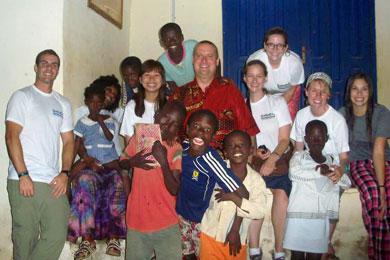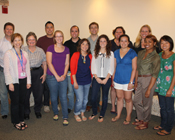SOP Student Breaks Borders, Travels to Ghana for Malaria Prevention Program
Second-year student pharmacist immerses herself in local culture while working as a Summer Serve and Learn Volunteer for the Ghana Health and Education Initiative.

By Malissa Carroll
October 11, 2013
Before moving to the United States at age 14, Salin Nhean, a second-year student pharmacist at the University of Maryland School of Pharmacy, spent her childhood in Cambodia, where she witnessed first-hand the conditions to which people living in developing countries are often exposed.
“As someone who has lived in both Cambodia and the United States, I have a strong interest in global health, and I know that there is so much that individuals from developed countries can do to help those less fortunate,” she says.
To help set the example, Nhean spent two weeks during the summer between her first and second year at the School of Pharmacy as a Summer Serve and Learn Volunteer for the Ghana Health and Education Initiative (GHEI), a non-governmental organization established by School of Medicine alumna Diana Rickard, MD, MSHS, in 2001. Nhean worked with other volunteers from across the world to support the program’s ongoing malaria prevention initiatives in the village of Humjibre and its surrounding communities.
“After discovering that one of GHEI’s goals was to create a sustainable malaria prevention program in the region, I knew that I wanted to get involved,” says Nhean, who learned about the program from fellow student pharmacists. “Knowing that the organization doesn’t just send volunteers who leave, never to return, once their service is complete – that it is committed to the program’s success and follows up with the locals each year – was one of the primary reasons that I chose to join.”
A serious and sometimes fatal disease, malaria is caused by a parasite that infects a type of mosquito that feeds on humans. According to the World Health Organization, an estimated 219 million people are diagnosed with malaria each year. Approximately 660,000 people die as a result of this illness. Ninety-one percent of those deaths occur in the African region.
However, there are a number of simple measures that can be taken to prevent the spread of this serious illness. One measure involves the use of long-lasting, insecticide-treated bed nets.
“In 2007, GHEI volunteers began to distribute bed nets in one of the local communities and provided assistance with hanging, as well as use and maintenance, of the nets,” says Nhean. “Each year, the organization conducts a survey to evaluate the impact of this intervention on bed net ownership, use, and maintenance, as well as to determine if there are any areas in which improvements are needed.”
This intervention has benefitted more than 5,000 individuals, and though its impact on the local community is undeniable – with bed net usage increasing from 14 to 97 percent among individuals living in the village – Nhean says that it is the members of the community who leave the greatest impression on the volunteers.
“The villagers taught us how to speak their language, known as Twi, and showed us how to drum and dance accordingly to local customs,” recalls Nhean. “I also spent a lot of my free time with the children, who were outside waiting to play with the volunteers each morning. They loved to play soccer, so we would play with them and just enjoy having fun.”
She adds, “I don’t think of this program as just a group of volunteers who travel to Ghana to provide services for the local people. The concept of ‘providing services’ implies to me that the people who are delivering those services are somehow above the people who are receiving the services. Instead, I think of this program as a mutually beneficial relationship between us as volunteers and the local community.”
Nhean, who hopes to pursue a residency in HIV/AIDS or infectious disease after graduating from the School of Pharmacy, also found that her experience with GHEI reinforced her commitment to become a pharmacist, as her training will “equip [me] with the knowledge and tools necessary to continue making an impact on individuals living in developing countries.” She remains involved with the organization as a volunteer application reviewer, interviewing other individuals who are interested in volunteering with GHEI.
“One of the best things about this organization is that you don’t need to have any previous experience with global health before you volunteer. Although there were a lot of people with public health backgrounds in my volunteer group, we also had one volunteer who worked for an investment bank and another who was in marketing,” she says.
Individuals who are interested in volunteering with the organization are encouraged to visit its website at www.ghei.org to submit an online application.

